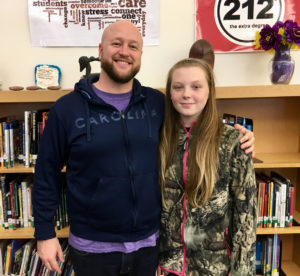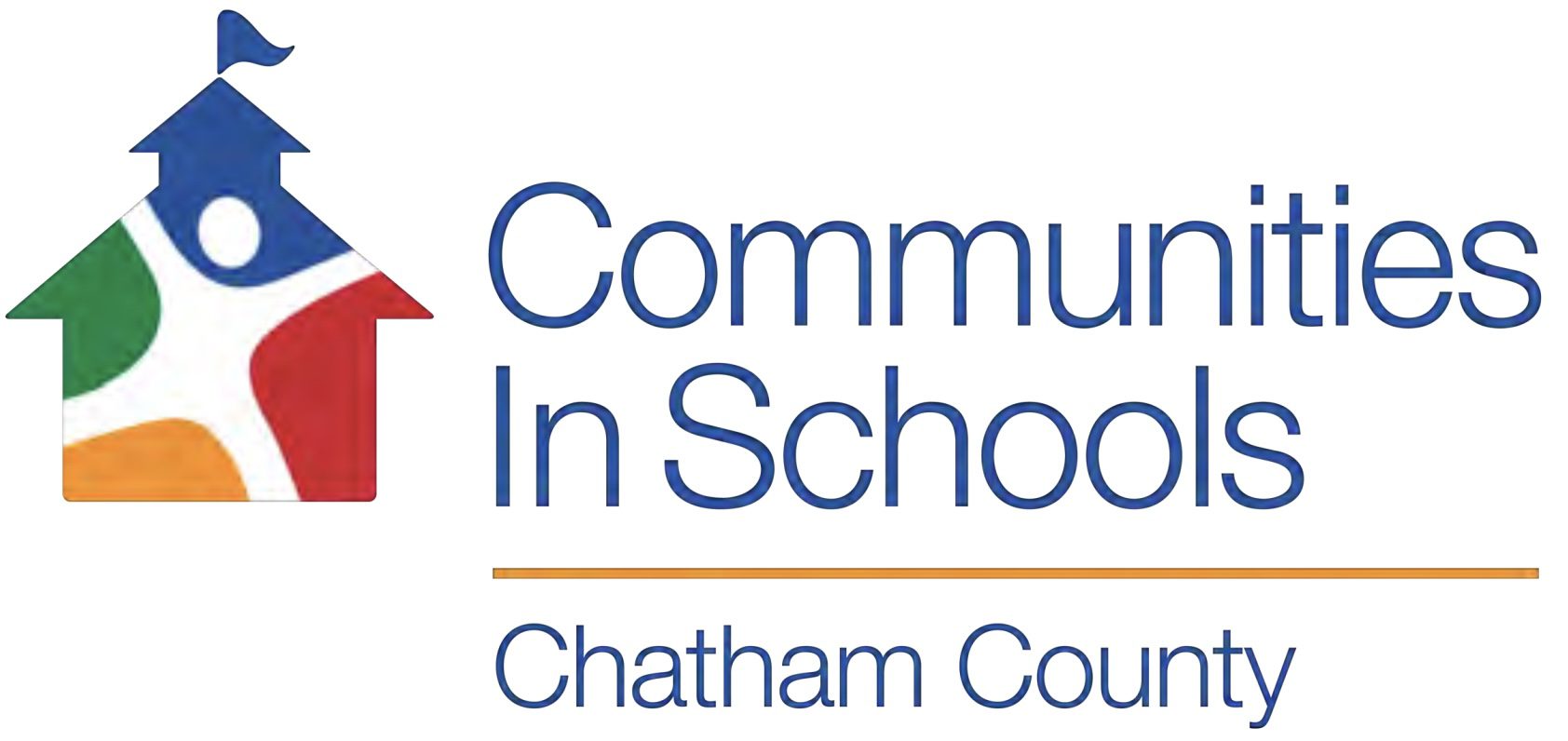
On a cold January morning in 2015, in the middle of the school year, a school bus pulled up to the America’s Best Inn motel in Siler City. It was the first day of school for Kaylin, a new sixth grader at Chatham Middle School whose family had just arrived in town. Neither of Kaylin’s parents had jobs. Her father, an Army veteran who had served in Iraq, Afghanistan and Korea, suffered from post-traumatic stress disorder, and the family was homeless, living in the motel, with the Veterans Administration picking up their tab for the first three weeks.
The latest in a string of dislocating moves by the military family during her short life had left the 13-year-old feeling self-conscious and isolated. “It was kind of hard,” says Kaylin, now 14 and an eighth-grader at Chatham Middle who lives with her family in a trailer park. “I didn’t know anybody.” Then she met Tych Cowdin, the Student Support Specialist in the school for Communities In Schools of Chatham County and the middle school winner of this year’s annual Impact Award from Communities In Schools of North Carolina.
When asked what difference he has made in her life in the nearly three years they have known one another, Kaylin pauses for a long moment, then apologizes for what she says may sound like a trite comment, “He’s like a savior,” she says.
Cowdin says that when Kaylin first enrolled at Chatham Middle she “had decent grades, but she had a lack of extracurricular or enrichment opportunities. “She was siloed in Siler City because of poverty,” he says. “There were a lot of opportunities for her to break down and give up over the last two years.”
A Plan for Kaylin
Cowdin, a member of the leadership team at the school, created a plan to provide Kaylin with support in and outside school. He signed her up to receive a food bag every Friday with meals for the weekend. He enrolled her in a program to learn about cooking and nutrition. He tutored her two afternoons a week after school. Cowdin also arranged for Kaylin to volunteer in a one-day town beautification project that would connect her to other kids. Last year, he enrolled her in a program to learn about careers and also in a one-week overnight camp.
Kaylin, who already was a good student, has earned all A’s and B’s in her classes. This fall, she played in the outfield on the school’s softball team — her first experience with a team sport — and was voted the most improved player. She wrote a poem about the experience, with a degree of detail that Cowdin — who played football and baseball in college — says he himself never could have put into words. “She’s an amazing student,” says Cowdin, who in 2014 piloted the Communities In Schools program in Chatham Middle. “She’s really developed some goals and some purpose despite every possible obstacle you could think of for a middle-school girl.
Social-Emotional Learning
The support Cowdin has provided for Kaylin is precisely what Communities In Schools is all about, says Kim Caraganis, Executive Director of Communities In Schools of Chatham County. Communities In Schools focuses on “having a caring adult, in addition to a parent, someone outside the family that can open windows for a young person they may not have access to, that can give this young person a vision of what they can be, where they can go, what are the possibilities,” she says.
As the student support specialist at Chatham Middle, Cowdin serves as case manager for 56 students, or 10 percent of the student population. Based on their individual needs, he typically meets at least every week or two with each student assigned to him, and sometimes as often as once or more a day. He develops a plan and goals for each student. And as needed, he finds community partners to provide services to address the needs of the student or family. “It really boils down to a lot of mentoring,” Cowdin says. “Kids often don’t have anybody they can view as a role model or somebody to talk with or look up to — somebody there at school they can have a relationship with.”
Caraganis agrees. “Kids need to be seen and given positive messages, given encouragement,” she says. “It affirms that you’re valued. It gives you connection.” Many children face hurdles outside school ranging from stress to trauma that can hurt their academic performance, she says. “When you have someone who is kind and encouraging,” she says, “it just opens you up again in a way that allows you to remove some of the barriers.”
In October, Cowdin helped Kaylin’s older sister, who had dropped out of 10th grade, enroll in a literacy program leading to a general equivalency diploma, or GED. He also has helped Kaylin’s mother, who has just started a job working in a chicken plant, enroll in a program volunteering in the community. “He went above and beyond everything,” says Tammy, Kaylin’s mom. “Kaylin has excelled physically, mentally, emotionally because of him.”
Community Connections
In addition to his work with individual students, Cowdin coordinates roughly a dozen school-wide programs that serve about 100 students and 50 families in partnership with 10 community agencies. He also coordinates six small groups of four to 10 students each that meet with social workers, guidance counselors, volunteers and other service providers on issues ranging from mental health to chronic stress. “His impact on the school has been just monumental,” says Chad Morgan, who joined Chatham Middle School as principal in 2014 at the same time Cowdin became the school’s student support specialist for Communities In Schools. “My goal was to focus on community involvement in the school because there was none,” Morgan says.
At the school, 75 percent of students are Hispanic, 15 percent are black, and over 88 percent are eligible for lunch that is free or at a reduced price. Over the past three years, Morgan says, the percentage of students performing at grade level has grown to 48 percent from 25 percent. Cowdin has been “instrumental in reaching out to the community at large and telling our story, letting them know areas where we need support, finding people with the same vision and goal, and helping them support not only our students but our families,” Morgan says. “He’s my right hand when it comes to making those community connections and building those community partners,” he says.
Cowdin also has had a big impact on Kaylin, Morgan says. “There are a lot of struggles in her life that are non-academic,” he says. “Without his support and making those connections, she probably would have fallen through the cracks.”
Kaylin says Cowdin has been her inspiration. After high school and college, where she may study marine biology, she says, she wants to be either a counselor or physician. “I kind of want to do things like Mr. Tych,” she says, “helping people.”
